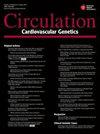全外显子组测序在成人遗传性心血管疾病临床诊断和治疗中的应用
Q Medicine
引用次数: 52
摘要
背景-随着高通量测序的出现,心血管疾病(CVD)遗传原因的鉴定已成为医学诊断和管理的一个组成部分,并处于该领域个性化医疗的前沿。全外显子组测序在遗传性心血管疾病的临床诊断、风险分层和管理中的应用此前尚未得到评估。方法和结果:我们分析了前200名遗传性心血管疾病成年患者的全外显子组测序结果,这些患者在耶鲁大学心血管遗传学项目接受了基因检测。遗传诊断达到并报告成功率为26.5%(200例患者中有53例)。相比之下,18%(200人中有36人)可以通过商业上可获得的基因面板进行诊断(P=0.04)。全外显子组测序对流产性心源性猝死患者的临床诊断特别有用,在这些患者中,心功能下降和QT间期延长的主要原因尚不清楚。利用基因组注释和疾病分离对剩余病例进行分析,在另外14%的病例中发现了新的候选基因。结论:全外显子组测序是一种非常有价值的筛查工具,因为它能够建立遗传性心血管疾病的临床诊断,特别是对于定义不明确的心源性猝死病例。通过提出新的候选基因及其潜在的疾病关联,我们也为使用这种遗传工具鉴定新的CVD基因提供了证据。跨护理中心创建和共享外显子组数据库应该有助于发现未知的心血管疾病基因。本文章由计算机程序翻译,如有差异,请以英文原文为准。
Application of Whole Exome Sequencing in the Clinical Diagnosis and Management of Inherited Cardiovascular Diseases in Adults
Background— With the advent of high throughput sequencing, the identification of genetic causes of cardiovascular disease (CVD) has become an integral part of medical diagnosis and management and at the forefront of personalized medicine in this field. The use of whole exome sequencing for clinical diagnosis, risk stratification, and management of inherited CVD has not been previously evaluated. Methods and Results— We analyzed the results of whole exome sequencing in first 200 adult patients with inherited CVD, who underwent genetic testing at the Yale Program for Cardiovascular Genetics. Genetic diagnosis was reached and reported with a success rate of 26.5% (53 of 200 patients). This compares to 18% (36 of 200) that would have been diagnosed using commercially available genetic panels (P=0.04). Whole exome sequencing was particularly useful for clinical diagnosis in patients with aborted sudden cardiac death, in whom the primary insult for the presence of both depressed cardiac function and prolonged QT had remained unknown. The analysis of the remaining cases using genome annotation and disease segregation led to the discovery of novel candidate genes in another 14% of the cases. Conclusions— Whole exome sequencing is an exceptionally valuable screening tool for its capability to establish the clinical diagnosis of inherited CVDs, particularly for poorly defined cases of sudden cardiac death. By presenting novel candidate genes and their potential disease associations, we also provide evidence for the use of this genetic tool for the identification of novel CVD genes. Creation and sharing of exome databases across centers of care should facilitate the discovery of unknown CVD genes.
求助全文
通过发布文献求助,成功后即可免费获取论文全文。
去求助
来源期刊

Circulation-Cardiovascular Genetics
CARDIAC & CARDIOVASCULAR SYSTEMS-GENETICS & HEREDITY
CiteScore
3.95
自引率
0.00%
发文量
0
期刊介绍:
Circulation: Genomic and Precision Medicine considers all types of original research articles, including studies conducted in human subjects, laboratory animals, in vitro, and in silico. Articles may include investigations of: clinical genetics as applied to the diagnosis and management of monogenic or oligogenic cardiovascular disorders; the molecular basis of complex cardiovascular disorders, including genome-wide association studies, exome and genome sequencing-based association studies, coding variant association studies, genetic linkage studies, epigenomics, transcriptomics, proteomics, metabolomics, and metagenomics; integration of electronic health record data or patient-generated data with any of the aforementioned approaches, including phenome-wide association studies, or with environmental or lifestyle factors; pharmacogenomics; regulation of gene expression; gene therapy and therapeutic genomic editing; systems biology approaches to the diagnosis and management of cardiovascular disorders; novel methods to perform any of the aforementioned studies; and novel applications of precision medicine. Above all, we seek studies with relevance to human cardiovascular biology and disease. Manuscripts are examined by the editorial staff and usually evaluated by expert reviewers assigned by the editors. Both clinical and basic articles will also be subject to statistical review, when appropriate. Provisional or final acceptance is based on originality, scientific content, and topical balance of the journal. Decisions are communicated by email, generally within six weeks. The editors will not discuss a decision about a manuscript over the phone. All rebuttals must be submitted in writing to the editorial office.
 求助内容:
求助内容: 应助结果提醒方式:
应助结果提醒方式:


